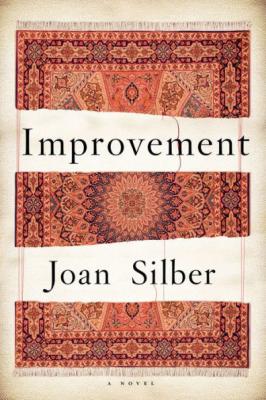“I’m still more of a short story writer,” Joan Silber remarked in a 2016 interview. “I move around somewhat quickly. I cover a lot of time in a short space. That gives a different sense of event.” Time sprints by in Improvement, her new novel, and events over time interlink with a click-shut finality. In her short story collections, Ideas of Heaven and Fools, both nominated for the National Book Award, an account of one life is spliced with another until an entire narrative org chart is manifest in the mind.
 The same predilection for pinning lives on an extended line occurs in Improvement — beginning with Reyna, a single mother living in Harlem whose boyfriend hatches a plan to haul inexpensive cigarettes from Virginia up to New York for sale. Boyd and his associates ask Reyna, who is white and thus a less suspicious character, to make the trip. She hesitates. Meanwhile, Reyna’s aunt Kiki, who lives downtown, had lived many years earlier in Istanbul where she married and left a Turk, returning to American with several rugs to sell. Finding ways to gain an edge, often through a scheme, becomes a sort of leitmotif. Reyna makes a fateful decision about Boyd’s caper and the novel begins to branch out.
The same predilection for pinning lives on an extended line occurs in Improvement — beginning with Reyna, a single mother living in Harlem whose boyfriend hatches a plan to haul inexpensive cigarettes from Virginia up to New York for sale. Boyd and his associates ask Reyna, who is white and thus a less suspicious character, to make the trip. She hesitates. Meanwhile, Reyna’s aunt Kiki, who lives downtown, had lived many years earlier in Istanbul where she married and left a Turk, returning to American with several rugs to sell. Finding ways to gain an edge, often through a scheme, becomes a sort of leitmotif. Reyna makes a fateful decision about Boyd’s caper and the novel begins to branch out.
While the canny plotting of Improvement generates a wondrous frisson, my pleasure mainly derives from the companionability of Silber’s sustained tone – of forbearance, cool assessment, and a classically controlled comic spirit. Events inform each other, but Silber’s characters exist as discrete objects. They integrate within the narrative voice, the artistic illusion of a mind that sees it all connecting. These characters are observed — what the narrator says about them is a sort of hearsay, a retelling at street level, not an explanation from a height. One might say that the narrator sounds experientially mature and not easily taken in. Here is the opening paragraph, referring to Kiki:
Everyone knows this can happen. People travel and they find places they like so much they think they’ve risen to their best selves just by being there. They feel distant from everyone at home who can’t begin to understand. They take up with beautiful locals of the opposite sex, they settle in, they get used to how everything works, they make homes. But maybe not forever.
 The voice of Reyna in the first chapter yields the microphone to an identical unnamed voice – and then Reyna turns up at the end to add a final perspective, slightly atilt, a gesture Silber picked up from Chekhov. In the intervening chapters, characters of different generations and in various global locales make trivial or critical decisions that tangentially or crucially affect other characters. I refuse to say more about them, for your benefit.
The voice of Reyna in the first chapter yields the microphone to an identical unnamed voice – and then Reyna turns up at the end to add a final perspective, slightly atilt, a gesture Silber picked up from Chekhov. In the intervening chapters, characters of different generations and in various global locales make trivial or critical decisions that tangentially or crucially affect other characters. I refuse to say more about them, for your benefit.
The limits of sentiments, thinking, and relationships are Silber’s stock in trade. Given the linkages of people in her fiction, interviewers like to ask her about how she “enters into so many minds at once” or “feels empathy so deeply for such an array of characters.” But Silber loves limitations and form – including those limitations of her narrators. She does not indulge the widespread, annoying habit of novelists who think their job is to help readers feel sympathy for themselves or build self-esteem. Silber wants us to see first, then imagine that perhaps we understand. She reflects honestly on the external world and is not inclined to create sentimentalized moral frameworks.
Here below, Reyna speaks about visiting Boyd at Riker’s Island:
I loved Boyd but I wouldn’t have said I loved him more than the others I’d been with. Fortunately no one asked. Not even Boyd. There was no need for people to keep mouthing off about how much they felt, in his view. Some degree of real interest, some persistence in showing up, was enough. Every week I watched him waiting in that visitors’ room, another young African-American in a stupid jumpsuit. The sight of him – heavy-faced, wary, waiting to smile slightly – always got to me, and when I hugged him (light hugs were permitted), I’d think,it’s still Boyd, it’s Boyd here.
 Some degree of real interest, some persistence in showing up, is exactly what you get from Silber herself. She knows exactly how much we, visiting her prose fiction, need that hug. The fluidity of her style, both intimate and forthcoming, is captivating. Her diction makes one feel that she is conversing, not just reaching for the next fictional phrase.
Some degree of real interest, some persistence in showing up, is exactly what you get from Silber herself. She knows exactly how much we, visiting her prose fiction, need that hug. The fluidity of her style, both intimate and forthcoming, is captivating. Her diction makes one feel that she is conversing, not just reaching for the next fictional phrase.
At mid-novel, characters named Silas and Darisse go to the movies. In the film, the leading man had done something hilariously dumb. “’People think they’re so smart and then they’re not,’ he said. ‘That’s the plot of all funny movies, right there. Don’t you think?’” This is the world of Improvement, right there.
[Published November 14, 2018. 256 pages, $26.00 hardcover]